Say You Want a Revelation
By Beth Davies-Stofka
March 25, 2010 - 18:46
DC Comics
Writer(s): Grant Morrison, Philip Bond, Warren Pleece, Sean Phillips, Jay Stephens, Frank Quitely, John Stokes, et. al
ISBN: 1401200192
Paperback, 288 pages, $19.95 US
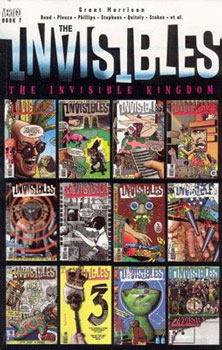 |
They also use martial arts and guns, although by the end of the series, they have learned nonviolent methods that are more effective.
At the very beginning of the series, the Invisibles recruit a young thug named Dane McGowan from the streets of Liverpool, and teach and nurture him as a messiah. At the end of the series, Dane saves the human race from catastrophe and slavery, and ushers in the new age.
Reception of The Invisibles, particularly the last 12 issues, was often quite dramatic. Some readers claimed their heads had exploded, while others claimed that their powers as magicians had improved and that they were having the best sex of their lives. Readers seemed to agree that conceptually, The Invisibles was one of the most intricate and complex comics they had read.
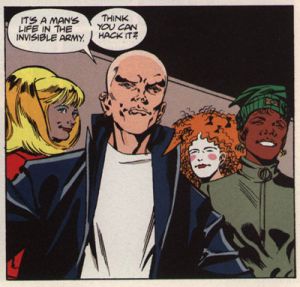 |
But Morrison turns ancient apocalyptic conventions inside out.
The word apocalypse means "revelation," a set of revealed truths delivered by supernatural means. Apocalyptic literature divides history into set periods, and illustrates the idea of a new creation coming to replace the present order. Apocalyptic literature contains allegorical visions and otherworldly journeys by which the reader is taken on a tour to the very ends of the universe. The reader is warned of a coming judgment.
The Invisibles adopts all these aspects of apocalyptic literature, yet Morrison sheds the normally ominous Judeo-Christian warnings in favor of a radical vision of a new creation in which there is no death and no judgment. In Morrison's revelation, everyone is delivered from the burdens of ancient religions, rules, and laws, and everyone lives.
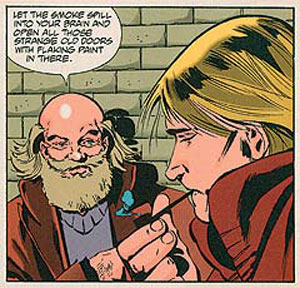 |
Many Christians accept John's apocalypse as God's word, and find ways to live their lives according to its admonitions and predictions. Meanwhile, from pulpits and cable television, we hear warnings of coming tribulations. Pop culture preachers aggressively condemn so-called idolaters, black magic practitioners, and the "sexually immoral," all supposed enemies of God, described by Revelations as shameful and deceitful people.
In other words, from the standpoint of preachers and scriptures, the enemies of God are, well, the Invisibles!
Morrison's Invisibles have no fear or shame about sex or magic. The powerful sorcerer Lord Fanny is a beloved Brazilian transvestite. It is part of teenager Dane McGowan's maturation to overcome his prejudices and bond with her.
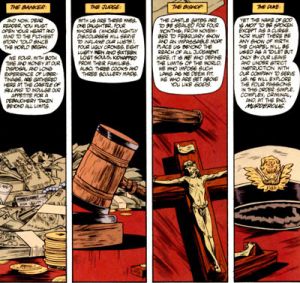 |
In their struggles to comprehend the coming new age and their place in it, the Invisibles employ tarot, telepathy, psychic projections and other magical tools. The Bible's Revelations might make us think we should condemn Morrison's heroes. But Jesus, the Buddha, and the Hindu gods Kali and Ganesha all play their part in helping them.
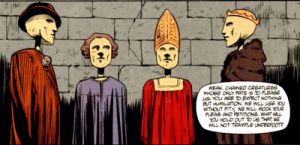 |
In John's apocalypse, a blood-drenched army from heaven fights and destroys the armies of the kings and the Beast. In Morrison's apocalypse, a loving and nurturing Goddess-figure speaks to us on the eve of our liberation from ignorance, saying, "I love you."
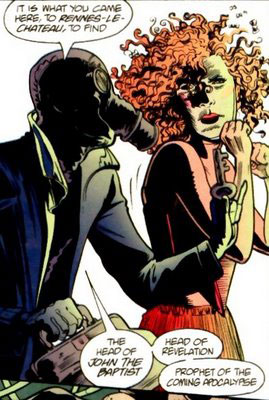 |
We made Gods and jailers because we felt small and ashamed and alone. We let them try us and judge us and, like sheep to slaughter, we allowed ourselves to be…sentenced.
See! Now! OUR SENTENCE IS UP.
For some faithful Christians, John's apocalypse provides a foundation for belief and morality. The thing is Grant Morrison hopes no less for his apocalyptic vision. He has said that he wants the entire series to serve as a kind of "hypersigil," a magical meme that could nurture the liberated consciousness he describes. In his view, the priests and the prophets have jailed the minds of men with a redemptive vision for the few. In Morrison's new age, the cosmic transformation is for all.
Rating: 9/10
Related Articles:
ComicBookBin Writer Zak Edwards Writes Master Thesis on Grant Morrison’s The Invisibles
